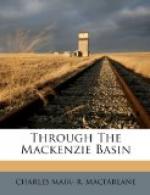We were now constantly encountering the rapids, which extended for about twenty-five miles, and very difficult and troublesome they proved to be to our heavily-loaded craft. Most of them were got over slowly by combined poling and tracking, the line often breaking with the strain, and the boats being kept in the channel only by the most strenuous efforts of the experienced men on board. If a monias (a greenhorn) took the bow pole, as was sometimes the case, the orders of our steersman, Cyr, were amusing to listen to. “Tughkenay asswayegh tamook!” (Be on your guard!) “Turn de oder way! Turn yourself! Turn your pole—Hell!” Then, of course, came the customary rasp on the rocks, but, if not, the cheery cry followed to the trackers ashore, “Ahchipitamook!” (Haul away!) and on we would go for a few yards more. Once, towards the end of this dreary business, when we were all crowded into the Commissioner’s boat, where we took our meals, in the first really stiff rapid the keel grated as usual upon the rocks. With a better line we might have pulled through, but it broke, and the boat at once swung broadside to the current and listed on the rocks immovably, though the men struggling in the water did their best to heavy her off. The third boat then came up, and shortly afterwards the Police boat. But getting their steering sweeps fouled and lines entangled, it was nearly an hour before Cyr’s boat, being first lightened, could swing to starboard of the York, and take off the passengers. The York boat was then shouldered off the rocks by main force, and all got under way again. At this juncture our old Indian, Peokus—or Pehayokusk, to give him his right name, to wit, “The giblets of a bird”—met with a serious accident, which, much to our regret, laid him up for several days. In his eagerness to help he slipped from a sunken log, and the bruise knocked the wind out of him completely. We took off his wet clothes and rubbed him, and laid him by the fire, where the doctor’s care and a liberal dram of spirits soon fetched him to rights. A look of pleased wonder passed over his clumsy features as the latter did its work. Caliban himself could not have been more curiously surprised.
This was not our last stick: there were other awkward rapids near by; but by dint of wading, shouldering, pulling and tracking, we got over the last of them and into a deep channel for good, having advanced only five miles after a day of incessant toil, most of it in the water.
Our camp that night was a memorable one. The day was the fiftieth anniversary of Father Lacombe’s ministration as a missionary in the North-West, and all joined in presenting him with a suitable address, handsomely engrossed by Mr. Prudhomme on birch bark, and signed by the whole party. A poem, too, composed by Mr. Cote, a gentleman of literary gifts and taste, also written on bark, was read and presented at the same time. [The poem, the text of which was secured from the author too late for insertion here, will




